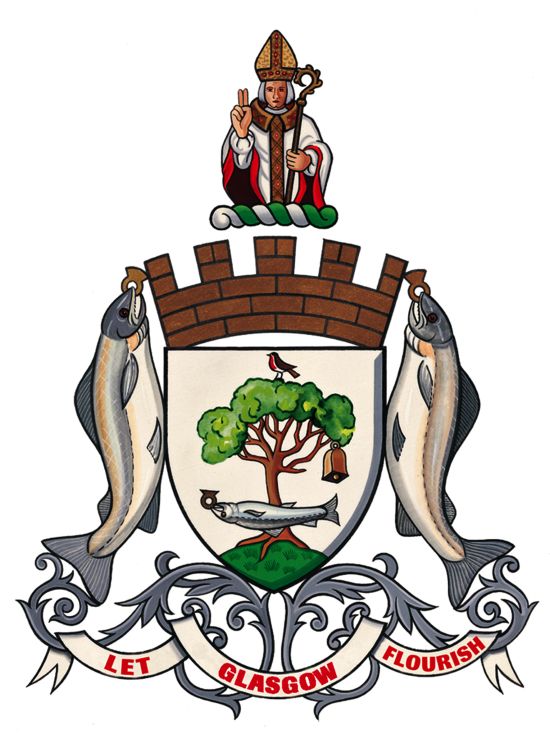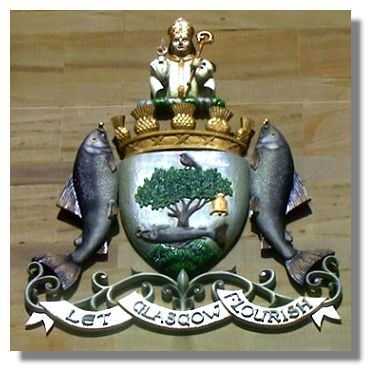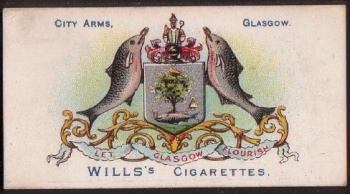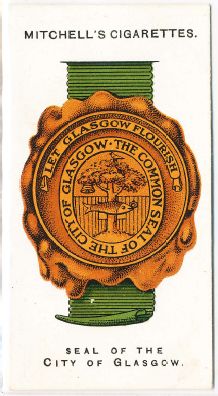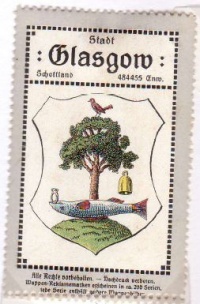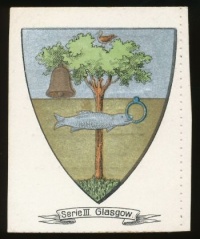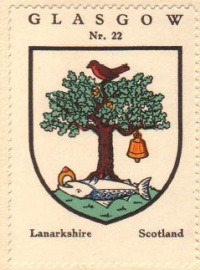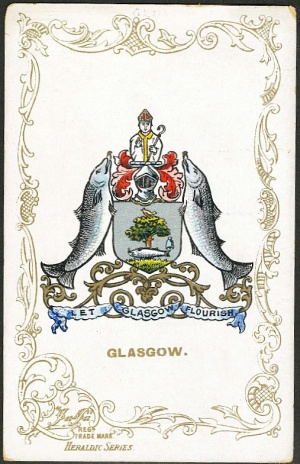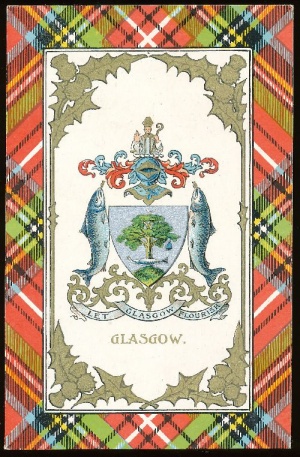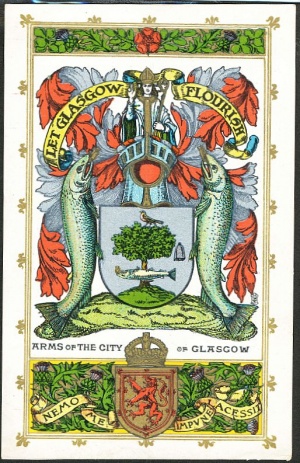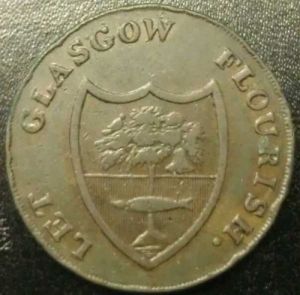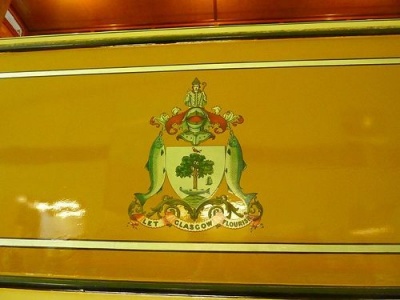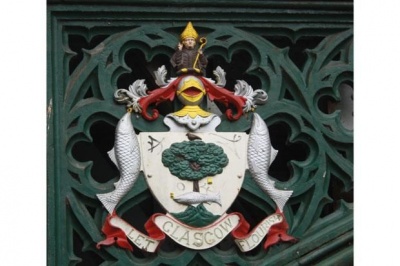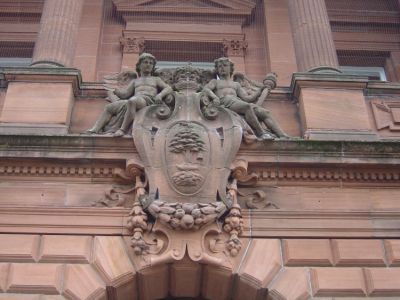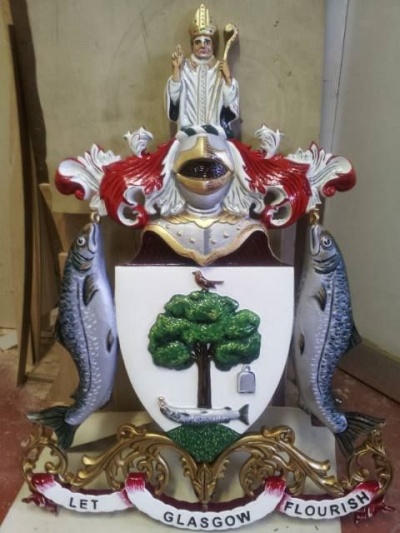Glasgow: Difference between revisions
Knorrepoes (talk | contribs) m (Text replacement - "|Arms of {{PAGENAME}}" to "|Arms (crest) of {{PAGENAME}}") |
Knorrepoes (talk | contribs) m (Text replacement - "|350 px]]" to "|350 px|Arms of {{PAGENAME}}]]") |
||
| Line 76: | Line 76: | ||
{|align="center" | {|align="center" | ||
|align="center"|[[File:Glasgow.tho.jpg|center|Arms (crest) of {{PAGENAME}}]] <br/>The arms on a cigarette card, +/- 1906 | |align="center"|[[File:Glasgow.tho.jpg|center|Arms (crest) of {{PAGENAME}}]] <br/>The arms on a cigarette card, +/- 1906 | ||
|align="center"|[[File:glasgow.wb1.jpg|center|350 px]] <br/>The arms on a [[Wills's - Borough arms I|Wills's]] cigarette card, 1906 | |align="center"|[[File:glasgow.wb1.jpg|center|350 px|Arms of {{PAGENAME}}]] <br/>The arms on a [[Wills's - Borough arms I|Wills's]] cigarette card, 1906 | ||
|align="center"|[[File:Glasgow.mit.jpg|center|Arms (crest) of {{PAGENAME}}]] <br/>The arms on a [[Mitchell Town Seals|Mitchell's]] cigarette card, 1911 | |align="center"|[[File:Glasgow.mit.jpg|center|Arms (crest) of {{PAGENAME}}]] <br/>The arms on a [[Mitchell Town Seals|Mitchell's]] cigarette card, 1911 | ||
|- | |- | ||
Revision as of 14:43, 12 March 2017
| Heraldry of the World |
| British heraldry portal Civic heraldry of the United Kingdom |
|
GLASGOW
City
Additions : 1996 Glasgow District Council
Official blazon
Argent, on a mount in base Vert an oak tree the stem at the base thereof surmounted by a on its back also Proper, with a signet ring in its Or; on the top of the tree a redbreast, and in sinister fess point an ancient handbell, both also Proper.
Above the Shield is placed a Coronet suitable to a statutory Council of a City, videlicet:- a mural coronet Or, masoned Sable, and on a wreath of the Liveries is set for Crest the half length figure of Saint Kentigern affrontee vested and mitred, his right hand raised in the act of benediction, and having in his left hand a crozier, all Proper. On a Compartment below the Shield are placed for Supporters two salmon Proper, each holding in its mouth a signet ring Or; and in an Escrol entwined with the Compartment this Motto "Let Glasgow Flourish".
Origin/meaning
The arms were officially granted on March 25, 1996.
The arms are those of the ancient burgh of Glasgow, see below, with a different crown.
District council
Additions : 1975 Glasgow Burgh, Rutherglen (1996 to South Lanarkshire)
Incorporated into : 1996 Glasgow City
Official blazon
Argent, on a mount in base Vert an oak tree Proper, the stem at the base thereof sur mounted by a salmon on its back also Proper, with a signet ring in its mouth Or, on the top of the tree a redbreast and in the sin ister fess point an ancient hand bell both also Proper.
Above the Shield is placed a coronet appro priate to a statutory District, videlicet:- a cir clet richly chased, from which are issuant eight thistle-heads (three and two halves vis ible) Or; and on a Wreath of the Colours is set for Crest the half length figure of Saint Kenti gern affrontee vested and mitred, his right hand raised in the act of benediction, and having in his left hand a crosier all Proper; and on a Compartment below the Shield, inscribed of this Motto "Let Glasgow Flou rish", are set for Supporters two salmon Proper each holding in its mouth a signet ring Or.
Origin/meaning
The arms were officially granted on February 6, 1975
The arms are those of the ancient burgh of Glasgow, see below, with a different crown.
Burgh
Additions : 1912 Govan
Incorporated into : 1975 Glasgow District (1996 Glasgow City),
Official blazon
Argent, on a mount in base Vert an oak tree Proper, the stem at the base thereof surmounted by a salmon on its back also Proper, with a signet ring in its mouth Or; on the top of the tree a red breast, and in the sinister fess point an ancient hand bell, both also Proper.
Above the Shield is placed a suitable Helmet, with a Mantling Gules doubled Argent, and, issuing out of a Wreath of the proper Liveries, is set for Crest the half-length figure of Saint Kentigern affrontee vested and mitred, his right hand raised in the act of benediction, and having in his left hand a crosier, all Proper; in a Compartment below the Shield are placed for Supporters two salmon Proper, each holding in its mouth a signet ring Or; and in an Escrol entwined with the Compartment this Motto "Let Glasgow Flourish".
Origin/meaning
The arms were officially granted on October 25, 1866.
The City of Glasgow had no single official armorial bearings until the 19th century. There were at least three official seals in use before a patent was granted by the Lord Lyon in 1866.
The emblems had been used in various forms and can be traced back to the seals of the Bishop of Glasgow. The fish was the first to appear, on the seal of Bishop William Wyschard in 1270, to be joined by the bird in 1271, on the seal of Bishop Robert Wyschard.
On a later seal of the prelate the tree, or at least a branch, is shown along with the fish and bird. The bell first appears in 1321 on the privy seal of the Chapter of Glasgow.
The first seal on which all the emblems are represented together is that of the Chapter of Glasgow used from 1488-1540, but it was not until 1647 that they appeared in something like their present combination on a seal 'maid by directioune of the toune'.
The bird commemorates the wild robin which St Serf, St Mungo's old master, tamed. It was accidentally killed by some of his disciples who blamed St Mungo. He took the dead bird in his hands and prayed over it, whereupon it was restored to life and flew chirping to its master.
The tree is now an oak but it started in the legend as hazel branch. As a boy in the monastery, Mungo was left in charge of the holy fire in the refectory. He fell asleep and some of the other boys, being envious of him, put out the fire. When he woke and found what had happened, Mungo broke off some frozen branches from a hazel tree and caused them to burst into flames by praying over them.
The bell may have been given to St Mungo by the Pope but there is no definite information as to how he obtained it. At any rate, in the 15th Century St Mungo's Bell had become a notable institution in Glasgow. In 1450, John Stewart the first Provost of Glasgow left, as did many others, an endowment to have the bell tolled throughout the city to call the inhabitants to pray for his soul. The City Treasurers' accounts for 1578 show an entry of two shillings "for one tong to Sanct Mungowis Bell" but the ultimate fate of the bell in unknown. A replacement was purchased by the magistrates in 1641 and this bell still exists in the People's Palace.
The fish with a ring in its mouth is a salmon and the ring was a present from Hydderch Hael, King of Cadzow, to his Queen Languoreth. The Queen gave the ring to a knight and the King, suspecting an intrigue, took it from him while he slept during a hunting party and threw it into the River Clyde. On returning home, the King demanded the ring and threatened Languoreth with death if she could not produce it. The Queen appealed to the Knight who, of course, could not help and then confessed to St Mungo who sent one of his monks to fish in the river, instructing him to bring back the first fish caught. This was done and St Mungo extracted the ring from his mouth. The scene is represented on the counter seal of Bishop Wyschard, made about 1271.
St Mungo - Patron Saint of Glasgow
There are many versions of the life of St Kentigern, but the following is generally accepted.
Born in the early 6th Century at Culross in Fife, he was the illegitimate son of Urien, Prince of Cumbria and The new (later known as Enoch), daughter of the King of Lothian. He trained as a priest at the monastery of St Serf at Culross where he was renamed Mungo, meaning dear friend. Mungo finished his training around 550 and visited the home of a dying holy man named Fergus who died on the night that Mungo arrived. Mungo placed his body on a cart yoked to two wild bulls, commanding them to convey it to the place ordained by the Lord. The bulls stopped at a place then known as Cathures where Fergus was buried. Mungo named the spot Glasgui which translates as 'dear green place' and established a church on the site which is now occupied by Glasgow Cathedral. Mungo died in 603, having lived an austere and holy life. He was canonised and became the Patron Saint of Glasgow with a feast day on the 13th January.
The motto "Let Glasgow Flourish", registered at the Lyon Court in 1866, is a curtailment of the text inscribed on the bell of the Tron Church cast in 1631 - "Lord let Glasgow flourish through the preaching of thy word and praising thy name".
The arms used in collector's items
| The arms on a cigarette card, +/- 1906 |
The arms on a Wills's cigarette card, 1906 |
The arms on a Mitchell's cigarette card, 1911 |
| The arms on a German trade stamp, pre 1910 |
The arms in the Continentale Verlags-Anstalt album, +/- 1910 |
The arms in the Coffee Hag albums +/- 1925 |
| The arms as used on a JaJa postcard +/- 1905 |
The arms as used on a postcard +/- 1905 |
The arms as used on a postcard +/- 1905 |
| The arms on an 18th century token (image from eBay) |
The arms used in the city
| The old arms on an old tram car (source) |
The old arms in the city (source) |
| The old arms above the entrance to The People’s Palace(source) |
The old arms in 3D (image from facebook) |
Contact and Support
Partners:
Your logo here ?
Contact us
© since 1995, Heraldry of the World, Ralf Hartemink 
Index of the site
Literature : Current image from here, old image from http://www.theglasgowstory.com; image of the 1975 arms from here; texts from Porteous, 1906; Urquhart 1979, 2001 and information brochure of the City of Glasgow +/- 1998


